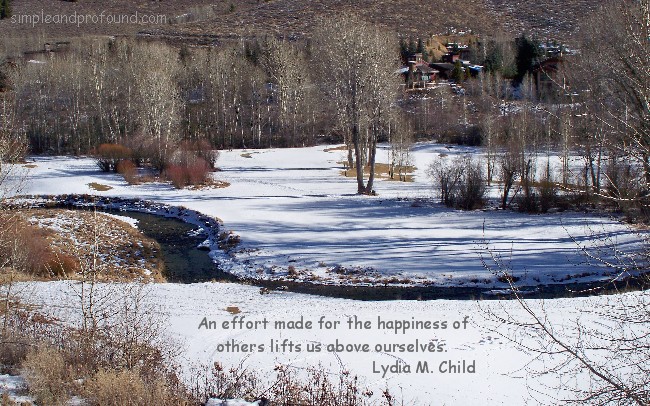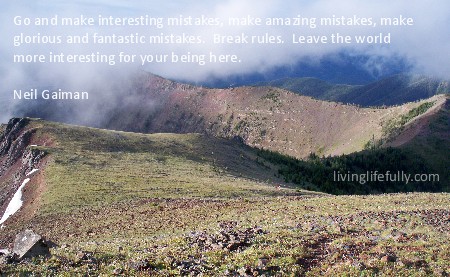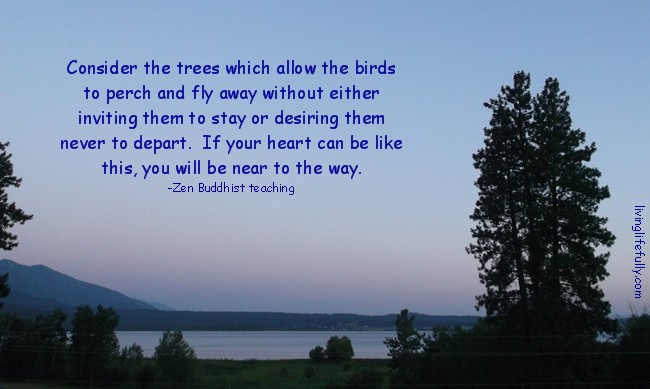|

28 July 2025
| |
|
|
| |
|
Simple and Profound
Thoughts
(from Simple
and Profound) |
|
My
view is that to sit back and let fate play its hand out and never
influence it is not the way people were meant to operate.
-
John
Glenn
|
People judge you
by your actions, not your intentions. You may have a heart of
gold, but so has a hard-boiled egg. -Good Reading
|
|
People
often mistake notoriety for fame, and would rather be remarked for
their vices and follies than not be noticed at all.
-
Harry S. Truman
|
The
question we do not see when we are young is whether we own pride
or are owned by it. -
Josephine
Johnson
|
|
| |
|

|
| |
|
Don't
Take Anything Personally
Don Miguel Ruiz
The next three
agreements are really born from the first agreement. The
second agreement is don't take anything personally.
Whatever happens
around you, don't take it personally. Using an earlier
example, if I see you on the street and I say, "Hey, you are
so stupid," without knowing you, it's not about you; it's
about me. If you take it personally, perhaps you believe you
are stupid. Maybe you think to yourself, "How does he
know? Is he clairvoyant, or can everybody see how stupid I
am?"
You take it
personally because you agree with whatever was said. As soon
as you agree, the poison goes through you, and you are trapped in
the dream of hell. What causes you to be trapped is what we
call personal importance. Personal importance, or
taking things personally, is the maximum expression of selfishness
because we make the assumption that everything is about
"me." During the period of our education, or our
domestication, we learn to take everything personally. We
think we are responsible for everything. Me, me, me, always
me!
Nothing other
people do is because of you. It is because of
themselves. All people live in their own dream, in their own
mind; they are in a completely different world from the one we
live in. When we take something personally, we make the
assumption that they know what is in our world, and we try to
impose our world on their world.
|

|
|
Even when a
situation seems so personal, even if others insult you directly,
it has nothing to do with you. What they say, what they do,
and the opinions they give are according to the agreements they
have in their own minds. Their point of view comes from all
the programming they received during domestication.
If someone gives
you an opinion and says, "Hey, you look so fat," don't
take it personally, because the truth is that this person is
dealing with his or her own feelings, beliefs, and opinions.
That person tried to send poison to you and if you take it
personally, then you take that poison and it becomes yours.
Taking things personally makes you easy prey for these predators,
the black magicians. They can hook you easily with one
little opinion and feed you whatever poison they want, and because
you take it personally, you eat it up.
You eat all their
emotional garbage, and now it becomes your garbage. But if
you do not take it personally, you are immune in the middle of
hell. Immunity to poison in the middle of hell is the gift
of this agreement.
When you take
things personally, then you feel offended, and your reaction is to
defend your beliefs and create conflicts. You make something
big out of something so little, because you have the need to be
right and make everybody else wrong. You also try hard to be
right by giving them your own opinions. In the same way,
whatever you feel and do is just a projection of your own personal
dream, a reflection of your own agreements. What you say,
what you do and the opinions you have are according to the
agreements you have made--and these opinions have nothing to do
with me.
It is not
important to me what you think about me, and I don't take what you
think personally. I don't take it personally when people
say, "Miguel, you are the best," and I also don't take
it personally when they say, "Miguel, you are the
worst." I know that when you are happy you will tell
me, "Miguel, you are such an angel!" But, when you
are mad at me you will say, "Oh, Miguel, you are such a
devil! You are so disgusting. How can you say those
things?" Either way, it does not affect me because I
know what I am. I don't have the need to be accepted.
I don't have the need to have someone tell me, "Miguel, you
are doing so good!" or "How dare you do that!"
No, I don't take
it personally. Whatever you think, whatever you feel, I know
is your problem and not my problem. It is the way you see
the world. It is nothing personal, because you are dealing
with yourself, not with me. Others are going to have their
own opinion according to their belief system, so nothing they
think about me is really about me, but it is about them.
You may even tell
me, "Miguel, what you are saying is hurting me."
But it is not what I am saying that is hurting you; it is that you
have wounds that I touch by what I have said. You are
hurting yourself. There is no way that I can take this
personally. Not because I don't believe in you or don't
trust you, but because I know that you see the world with
different eyes, with your eyes. You create an entire picture
or movie in your mind, and in that picture you are the director,
you are the producer, you are the main actor or actress.
Everyone else is a secondary actor or actress. It is your
movie.
The way that you
see that movie is according to the agreements you have made with
life. Your point of view is something personal to you.
It is no one's truth but yours. Then, if you get mad at me,
I know you are dealing with yourself. I am the excuse for
you to get mad. And you get mad because you are afraid,
because you are dealing with fear. If you are not afraid,
there is no way you will get mad at me. If you are not
afraid, there is no way you will hate me. If you are not
afraid, there is no way you will be jealous or sad.
If you live
without fear, if you love, there is no place for any of these
emotions. If you don't feel any of those emotions, it is
logical that you will feel good. When you feel good,
everything around you is good. When everything around you is
good, everything makes you happy. You are loving everything
that is around you, because you are loving yourself. Because
you like the way you are. Because you are content with
you. Because you are happy with your life. You are
happy with the movie you are producing, happy with your agreements
with life. You are at peace, and you are happy. You
live in that state of bliss where everything is so wonderful, and
everything is so beautiful. In that state of bliss you are
making love all the time with everything that you perceive.
|
|
more
thoughts and ideas on self
|
|
| |
|

(Simple and Profound is now a
part of this site. Visit by clicking
here.)
|
|
quotations
- contents
-
welcome
page
-
obstacles
the
people behind the words
-
our
current e-zine
-
articles
and excerpts
Daily
Meditations, Year One - Year
Two - Year Three
- Year Four
Sign up
for your free daily spiritual or general quotation -
- Sign
up for your free daily meditation
|
| |
|

|
We
have some
inspiring and motivational books that may interest you. Our main way of supporting this site is
through the sale of books, either physical copies
or digital copies for your Amazon Kindle (including the
online reader). All of the money that we earn
through them comes back to the site
in one way or another. Just click on the picture
to the left to visit our page of books, both fiction and
non-fiction! |
|
| |
|

|
| |
There
Is No Education like Adversity
Harvey Mackay
One school of
business studied 400 executives who had made it to the top and
compared them to 400 who fell by the wayside during their
careers. The idea was to discover how those who became
successful differed from those who didn't.
Education was
not the key factor because high school dropouts were running
companies, while some MBAs were slamming into dead ends.
Experience? Then those at the top should have been older, and
that wasn't the case. Technical skills, social skills and
dozens of other career-related variables were examined as
well. Those factors didn't provide the explanation either.
What is the
only single quality that distinguished those who made it from those
who did not? They persevered.
Adversity
will come to every person at some time. How you meet it, what
you make of it, what you allow it to take from you and give to you,
is determined by your mental habits. In short, you have to
take the cards in life that are dealt to you.
You can train
your mind to face life's toughest challenges-and it is especially
important to develop this habit before you actually need it.
Little children get their first lesson with "The Little Engine
that Could."
Faced with pulling many train cars up an enormous hill, larger
engines refused to attempt it. Finally, a small engine agrees
to try, repeating the mantra,
"I-think-I-can,
I-think-I-can." After reaching the crest, the little
engine triumphantly chugs:
"I-thought-I-could,
I-thought-I-could."
I'd like to
alter the story a bit for the grown-up crowd. Change the chant
to:
"I-know-I-can,
I-know-I-can!"
Adversity can
actually be a positive thing, even though it certainly doesn't feel
like it when we are facing it. Adversity is what defines
us. It is easy to have a great attitude, a strong work ethic
and a positive outlook when things are going great. But how do
we stand up during tough times?
Consider the
following phenomenal achievements of famous people who experienced
severe adversity:
- When Bob
Dylan performed at his high school talent show, classmates booed him
off the stage.
- Walt Disney
experienced both bankruptcy and a tragic nervous breakdown and still
made it to the top of the mountain.
- President
Harry S. Truman went broke in the men's clothing store he started.
- Sir Walter
Raleigh wrote the "History of the World" during a 13-year
imprisonment.
- Martin
Luther translated the Bible while enduring confinement in the Castle
of Wartburg.
- Dante wrote
the "Divine Comedy" while under a sentence of death and
during 20 years in exile.
- Handicapped
at birth, Helen Keller was not able to speak, hear or see during her
long life, yet she became a famous author and worldwide celebrity
for her charm and wisdom.
We must push
through the adversity we face. If we don't, we will be poorly
prepared for winning. People are successful because they face
adversity head on to gain strength and skill. They don't take
the path of least resistance. Adversity is a powerful teacher.
President
Abraham Lincoln said, "My great concern is not whether you have
failed but whether you are content with your failure."
And few people failed in early life as much as Lincoln, yet he is
regarded as one of our greatest presidents.
When you get
discouraged, when you cannot seem to make it, there is one thing
that you cannot do without. It is that priceless ingredient of
success called relentless effort. You must never give
up. Success cannot be achieved without experiencing some
adversity.
An Asian
saying advises, "When fate throws a dagger at you, there are
only two ways to catch it, either by the blade or by the
handle."
There was an
old farmer who had suffered through a lifetime of troubles and
afflictions that would have leveled an ordinary mortal. But
through it all he never lost his sense of humor.
"How
have you managed to keep so happy and serene?" asked a friend.
"It
ain't hard," said the old fellow with a twinkle in his
eye. "I've just learned to cooperate with the
inevitable."
"Cooperating
with the inevitable" enables us to catch adversity by the
handle, thereby using it as the tool that it was intended to be.
Mackay's
Moral: Adversity causes some people to break and others to
break records.
* * * * *
Copyright
Your Achievement Ezine
|
|

|
Unloving
Situations
Iyanla Vanzant
It is not loving to stay in a place or an experience where you
are happy sometimes, sad most of the time. It is not loving
to convince yourself that it is okay to stay in a place where you
are not loved, honored, and valued the way your heart tells you
you deserve to be. It is not self-loving, or is it loving to
others involved, to allow yourself to be mentally, emotionally, or
physically abused in hope that things can, or will, get
better. When you participate in actions and activities that
are not loving toward you, you are helping them do things that
hurt you, and that is not a loving thing to do.
It is easy
to convince yourself that you must stay where you are because you
have no place else to go; or because you know things could be
worse, or because you know things could get better. It is
easy to overlook things that eat away at your sense of self, your
sense of value, your sense of well-being. As easy as it may
be to blame someone else, to try to ignore what you feel, to call
your pain a sacrifice for love, you are not being loving or wise
to do so. Eventually, you will be held responsible for
everything you experience and how you have responded to it.
Love does
not ask us to lose ourselves, harm ourselves, or sacrifice
ourselves for its sake. Love offers to us, measure for
measure, what we offer it. If you are being dishonored,
disrespected, physically harmed for the love you give, you must
ask yourself, "Am I really giving love, or am I simply afraid
to leave?"
Until
today, you may have participated in being unloving toward
yourself. Just for today, allow yourself to stand in the
truth, honor and peace of love. Ask yourself, "Am I
receiving all that I am giving?" If not, ask yourself,
"Why not?"
Today
I am devoted to loving myself, honoring myself,
and removing myself from unloving experiences.
|
|
| |
|

|
|
Living
Life Fully, the e-zine
exists to try to provide for visitors of the world wide web a
place
of growth, peace, inspiration, and encouragement. Our
articles
are presented as thoughts of the authors--by no means do
we
mean to present them as ways that anyone has to live
life. Take
from them what you will, and disagree with
whatever you disagree
with--just know that they'll be here for you
each week. |
|
| |
|
Time
is a flowing river. Happy those who allow
themselves to be
carried,
unresisting, with the current.
They float through
easy days. They live, unquestioning,
in the moment.
Christopher
Morley
|
| |

Hurting Each Other
We
seem to live in a world in which hurting each other is the order
of the day, especially if we're talking about someone who
disagrees with us about something that's important to us. We
seem to have lost the ability to put ourselves in others' shoes,
to consider what they may be thinking or going through, to
disagree with them without mocking them or their ideas or their
standpoints. Social media have become battlegrounds for many
people, places that they use to mock and belittle anyone who
disagrees with them.
Of course, when we have people in public office who model this
type of behavior, it's very easy to fall into it ourselves.
When we see others attacking instead of engaging, belittling
instead of encouraging, it can easily become a norm, especially in
our subconscious minds. Once that happens, we find it quite
easy to behave in the same ways.
But insulting other people is still insulting others. I find
it amazing to see posts that are incredibly offensive, to which
someone has replied, "This offends me." Instead of
reflecting on why that person may be offended, though, the
original poster very often says things like, "You need to
lighten up," or "You're too sensitive." The
term "snowflake" more than likely originated when
someone wanted to offend someone else who had called them on their
offensive comments or posts.*
|
|
|
|
Unless we give part of ourselves away,
unless we can live
with other people and understand them
and help them,
we are missing the most essential part of
our own lives.
Harold Taylor
|
|
|
It's
one thing to witness such behaviors, though, and to try to learn
from them, and another thing completely to adopt them and allow
ourselves to become people who hurt instead of encourage, who
demean rather than support, who attack rather than educate.
In my own world, I try very hard to encourage as much as I can,
though I also do my best to try to contribute to the positive in
the world. Sometimes, though, this means confronting the
negative, or the negative or false information that some people
spread in order to try to make others afraid. I find it
almost impossible to tolerate, for example, Facebook posts that
tell lies about a certain group of people in order to make others
afraid of them. When I see such lies, I confront them, and I
do my best to provide documentation that the information being
presented is actually untrue. It's one thing to tell someone
that they're wrong, and quite another to tell someone that they're
wrong and provide them with accurate information so that they can
see quite clearly why they're wrong.
I'm not always very good at it--some of the lies that I see are
simply infuriating, and very obviously designed to harm someone
else quite deeply. It's hard to respond compassionately when
someone else is trying to harm someone because of their race or
gender or sexual orientation or their nationality. It's
important, though, that I do my best to give a measured response
that doesn't attack the person, but that lets someone know that
the information involved is false and harmful. Instead of
saying something offensive myself like "Only an idiot would
post something so stupid," I try to use language that's clear
and direct and uncompromising, such as "Spreading this type
of inaccurate information can be extremely harmful to many people;
here's an article that shows exactly why this information is
false."
|
|
|
|
Culture
makes people understand each other better. And if they
understand each other better in their soul, it is easier to overcome
the economic and political barriers. But first they have to
understand that their neighbor is, in the end, just like them,
with the same problems, the same questions.
Paulo Coelho
|
|
|
The truth of the matter is that we’re
all
trying our best to get by, to do what's right based on what we
believe to be right. Your right and my right may be two
different things. I'm not going to change anyone's mind
about the lies that they've helped to spread by insulting them and
belittling their own efforts to make sense of this world.
Perhaps they may be misguided--I know plenty of parents who are
teaching their children some very dangerous ways of looking at the
world, and I have no idea what other people's parents have taught
them.
One of my biggest pet peeves, though, comes to light in what's
happening at the demonstrations and riots that are happening all
across the country, especially focused on the Black Lives Matter
movement. I see post after post complaining about the
protesters because of the violence and destruction that have
occurred in some of the cities, but the blame and the anger tend
to be misplaced.
It's pretty common knowledge that very often, when there's a
peaceful protest, others who don't care a bit about the cause the
protesters are focused on will use the distraction of the protest
in order to cause mayhem or even to loot stores. There's a
huge difference between protesters and rioters, and the rioters
often use the protests as a distraction to do what they're going
to do.
People like to simplify matters, though. And for some
people, this simplification is necessary, no matter how wrong it
is. They see the headlines about protesters and the
headlines about looting and rioting, and they lump the two
together just because they were happening at the same time in the
same city. The truth is, though, that the vast majority of
protests on most matters is quite peaceful; they're only made to
look bad because of the actions of the rioters.
|
|
|
|
You know, we're all going in
the same direction, or at least
trying to. So we need to live together, get along together,
and give each other enough space to be comfortable on that road.
Lillian Gideon
|
|
|
The
problem happens when people attack the protesters for being
violent, when they show pictures of looting and attribute it to
the protesters. When they do this, they're adding to a huge
problem--people come to equate protesting peacefully with violent
acts, and that's a misconception that helps none of us. In
fact, some groups actually send in their own people to commit
violence during protests with the express purpose of causing this
misconception to be perpetuated.
When I see this happen, I try to correct the error, though, and
not attack the person--even if the person is attacking other
people who simply haven't done what they're being accused
of. It's much more effective in the long run to
educate people than it is to cut them down; it's much more human
to give them the benefit of the doubt, to believe that they've
simply made a mistake, than it is to immediately assume that they
have harmful motives.
There are too many people out there who are just fine hurting each
other, and I don't want to add myself to that group. While
we definitely have an obligation to tell the truth and a
responsibility to not allow harmful acts to go unchallenged, we
also have a higher calling to err on the side of kindness, if
indeed we do err. Let's not contribute to the anger and
hatred and vitriol of the world; rather, let's be people who try
to spread healing and hope, people who are trying to bring others
together so that we can work in harmony rather than people who are
looking to divide others so that we might feel just a little bit
better about ourselves because we see ourselves as superior to
some other group. Because the truth is that we're not
superior; we may be different, but that doesn't make us
"better."
|
|
|
|
|
|
*[The
term "snowflake has] developed a new and
decidedly less pleasant use as a disparaging term
for a person who is seen as overly sensitive and
fragile. In the lead-up to the 2016 U.S. elections
it was lobbed especially fiercely by those on the
right side of the political spectrum at those on the
left. (https://www.merriam-webster.com/words-at-play/the-less-lovely-side-of-snowflake)
|
|
|
|
|
| |
|

|
| |
|
 ™ ™
|
|
All contents
© 2025 Living Life Fully™,
all rights reserved.
Please feel
free to re-use material from this site other than
copyrighted articles--
contact each author for permission to use those.
If you use material, it would be
greatly appreciated if you would provide credit and
a link back to the original
source, and let us know where the material is
published. Thank you. |
|
| |
|

|
|
Only an
open mind still has room for
new knowledge. What is outgrown
and used up must be discarded to
make room for what is yet to be learned.
And much of the best thinking is
done alone--in deserts, on beaches,
in bed, behind closed doors. It is
why we say we need to get away--to
escape from clutter and busyness--to hear ourselves think.
Robert
Fulghum
|
|
| |
|
Because it is
possible to create--creating one’s self, willing to
be one’s self, as well as creating in all the
innumerable daily activities (and these are two phases
of the same process)--one has anxiety. One would
have no anxiety if there were no possibility
whatever. Now creating, actualizing one’s
possibilities, always involves negative as well as
positive aspects. It always involves destroying
the status quo, destroying old patterns within
oneself, progressively destroying what one has clung
to from childhood on, and creating new and original
forms and ways of living. If one does not do
this, one is refusing to grow, refusing to avail
oneself of one's possibilities; one is shirking his or
her responsibility to him- or herself. Hence
refusal to actualize one’s possibilities brings
guilt toward one’s self. But creating also
means destroying the status quo of one’s
environment, breaking the old forms; it means
producing something new and original in human
relations as well as in cultural forms (e.g., the
creativity of the artist). Thus every experience
of creativity has its potentiality of aggression or
denial toward other persons in one’s environment or
established patterns within one’s self. To put
the matter figuratively, in every experience of
creativity something in the past is killed that
something new in the present may be born. Hence,
for Kierkegaard, guilt feeling is always a concomitant
of anxiety: both are aspects of experiencing and
actualizing possibility. The more creative the
person, he held, the more anxiety and guilt are
potentially present.
Rollo May
|
|
| |
|
|

|
| |
|
Learning to forgive is much more
useful than merely picking up
a stone and throwing it at the object of one's anger; the more so
when the provocation is extreme. For it is under the greatest
adversity that there exists the greatest potential for doing good,
both for yourself and others.
The Dalai Lama
|
| |
|
